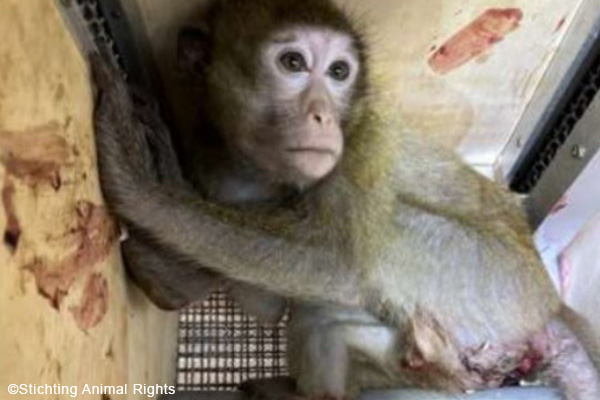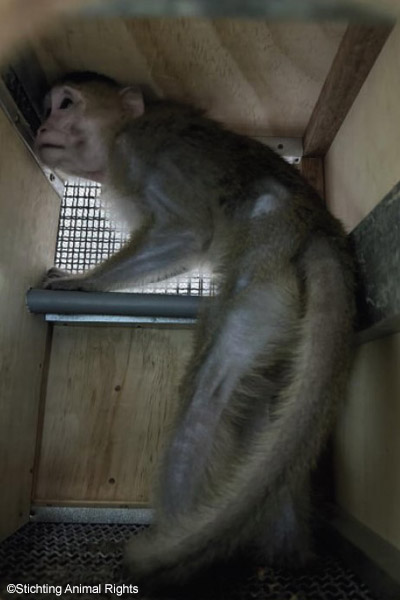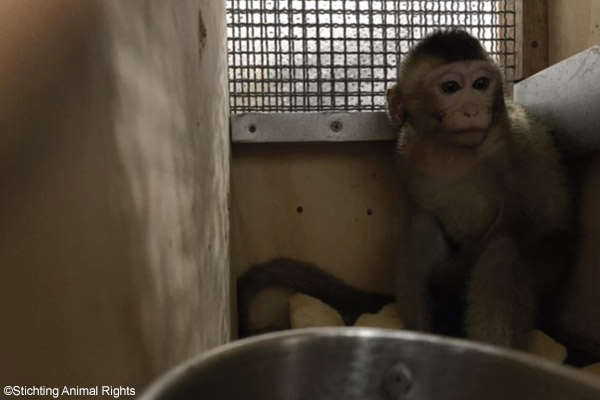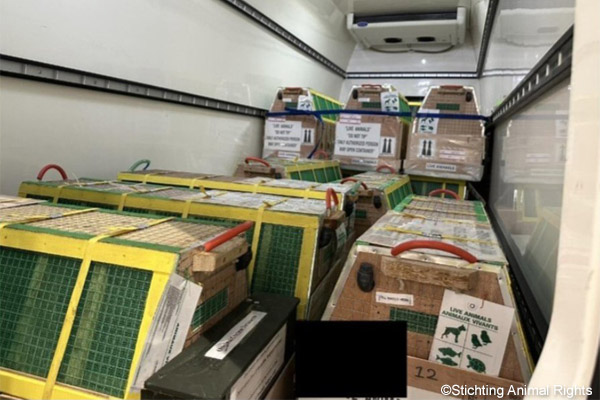Appalling conditions uncovered during monkey transports to laboratories
- Press release
Brussels Airport as a hub for global monkey trade
A recent investigation by the Dutch-Belgian organisation Animal Rights reveals shocking conditions in the transport of long-tailed macaques that are delivered to research laboratories worldwide. Brussels Airport plays a central role as a hub in the international trade in monkeys for laboratories. Together with other animal welfare organisations, the association Doctors Against Animal Experiments is calling for a ban on the import of monkeys to Europe and an end on the use of non-human primates for biomedical research altogether.
Animal Rights analysed inspection reports documenting transports from 2023 to August 2024 (1). The organisation gained access to the documents through Freedom of Information Act requests. The reports reveal that long-tailed macaques, which are classified as critically endangered, are transported under unacceptable conditions (2). Coming from Mauritius and Vietnam, the animals sometimes spend days travelling to Europe and North America. During this period, the transport of 2,761 monkeys was analysed. The animals travelled via Brussels to laboratories in the UK, France, Spain or the USA by plane or lorry. 88 of the animals from Vietnam were sent to Germany.
Photos and inspection reports now document the appalling suffering of the monkeys, who were transported alone in small wooden crates, in temperatures as low as 10°C in some cases, without adequate care. In May 2024, the authorities granted permission for the onward transport of one monkey, even though it had an anal prolapse. In July 2024, a monkey died during the flight to New York, presumably due to a stress-related reaction to tranquillisers.
“The long-tailed macaques experience unimaginable suffering not only in experimental laboratories, but also on the way there. In addition, the use of monkeys in biomedical research endangers the survival of the species,” explains Dr Melanie Seiler, primatologist and Director of Public Relations at Doctors Against Animal Experiments.
In addition, undercover research by the French organisation One Voice shows that many macaques are caught illegally from the wild and kept in appalling conditions in breeding facilities (3). According to CITES data, over 90,000 long-tailed macaques were exported for scientific purposes between 2020 and 2023 alone - including to Germany (4). Although EU law states that only the offspring of animals born in captivity may be used for research, undercover research repeatedly documents wild-caught animals. This poses a serious threat to the population of this already endangered species (5).
According to official statistics, over 2,200 monkeys were used in animal experiments in German laboratories in 2022, most of them for toxicity tests. These animals are mainly used by the company Labcorp (formerly Covance) in Münster, where toxic substances are administered to pregnant monkeys.
Together with other animal welfare organisations, Doctors Against Animal Experiments is calling for an immediate ban on the import of laboratory monkeys into Europe and an end to transport via Brussels Airport. “Animal-free methods, such as ‘organ-on-a-chip’ technology, offer animal-free and human-relevant opportunities to advance research and help patients,” says Dr Seiler.
Further Information
Animal experiments on non-human primates (in German) >>
Labcorp (Covance) – the largest user of non-human primates in Germany (in German) >>
Petition 'Stop brain research on monkeys' (in German) >>
References
- Investigation by Animal Rights >>
- Doctors Against Animal Experiments: Most common monkey species used in animal experiments on the brink of extinction. Press release, 10.09.2023 >>
- One Voice: Because it’s not only France. Macaques from the island of Mauritius in the hands of European and American Research >>
- Convention on International Trade in Endangered Species of Wild Fauna and Flora >>
Database Filter: Taxon: Macaca fascicularis, Years: 2020 – 2023, Purpose: Trade, Science, Medical; Trade terms: Live) - Hansen M.F. et al. Macaca fascicularis (amended version of 2022 assessment). The IUCN Red List of Threatened Species
- Bundesinstitut für Risikoforschung: Verwendung von Versuchstieren im Jahr 2022 >>





